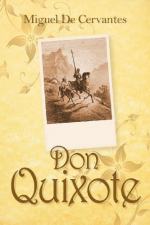|
|
Don Quixote Volume 1, Chapter 47
Ensconced in the crate for safekeeping, Don Quijote is confused over this less than magical mode of transportation that the spirits are using on him; for in the books he has read they ride through the air in a cloud or a chariot of fire.
Topic Tracking: Grandiosity 20
Sancho tries to hint to his master that there is something suspicious about these apparitions; he has touched one who reeks of perfume. They discuss the possibilities and impossibilities of a demon smelling pleasant (as Don Quijote believes this to be within the power of demons). Fearing Sancho's loose lips, he is silently ordered to ride upon his donkey (away from his master). The innkeeper's wife, her daughter and Maritornes play their parts and cry at Don Quijote's departure. Amid hugs and promises to write, the priest and barber take their leave of the cast of characters from As the Inn Turns.
The innkeeper gives the priest another short story from the trunk, this one entitled: "Rinconete and Cortadillo" (though not mentioned in the story, this is a story by Cervantes).
They meet up with a cathedral priest and his traveling party. Sancho admits to the priest that he recognizes him and that they are all ruining his chances to be governor of an island. The barber tells Sancho that he has been seduced (the Spanish can translate to "got pregnant by") these ridiculous promises of an island. Sancho defends himself:
"'No one's gotten me pregnant'...'and I'm not the kind of man who lets himself get pregnant, not even by the king, and though I may be poor, I'm an Old Christian.'" Volume 1, Chapter 47, pg. 325
The cathedral priest is filled in on the nature of this strange traveling party. It turns out that the cathedral priest also believes (like the priest of La Mancha) these fantastic imaginative books of knight errantry and chivalry to be a menace and danger to society, and a lengthy critique follows. He points out how the authors of these books don't even attempt to follow their own plot lines or any accepted rules of writing; but instead purposely aim at creating pages of mass nonsense and confusion.
The priest of La Mancha further adds that the genre has the potential to be something valuable as its form easily lends itself to fiction.




